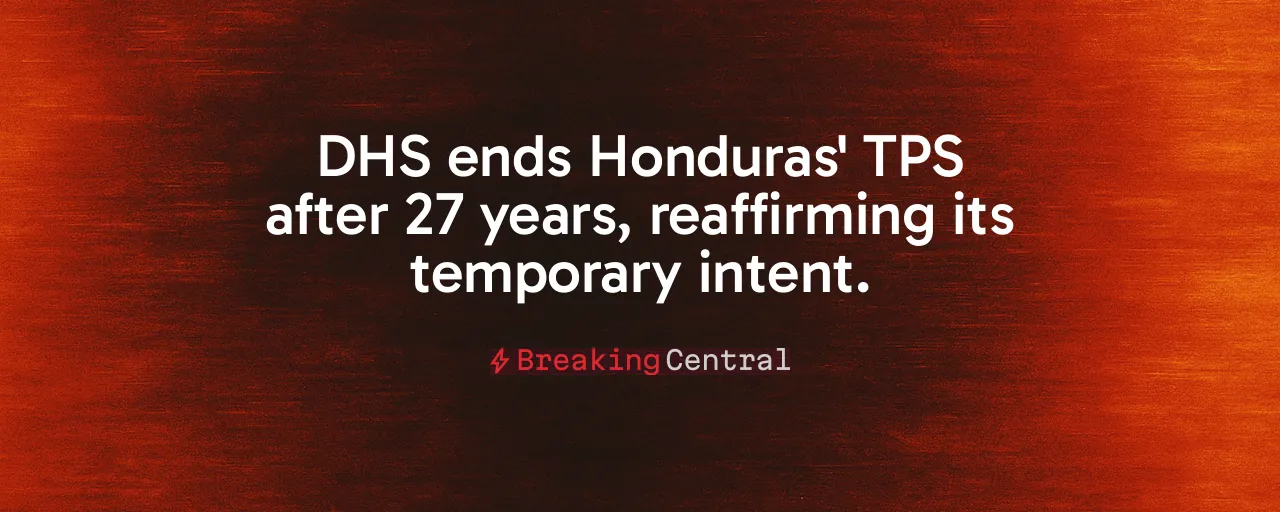A Long-Overdue Decision
The Department of Homeland Security's announcement on July 7, 2025, to terminate Temporary Protected Status for Honduras marks a pivotal moment. After nearly 27 years, the program, originally designed to offer temporary refuge following Hurricane Mitch in 1998, will conclude 60 days after its Federal Register notice. This decision, led by Secretary Kristi Noem, signals a renewed commitment to the original intent of TPS as a short-term humanitarian tool, emphasizing its temporary nature.
This move underscores a broader principle: immigration policies are designed to respect the rule of law while addressing practical realities. The decision resonates with Americans who value orderly systems over open-ended exemptions.
The termination affects roughly 54,000 Honduran TPS holders and their families, many of whom have built lives in the United States. Their contributions, from construction to healthcare, are undeniable. The challenge now is to balance compassion with clarity, ensuring a structured transition that upholds legal standards.
Why Temporary Means Temporary
The core issue lies in the word 'temporary.' When TPS was enacted under the Immigration and Nationality Act, it aimed to provide safe haven during acute crises. It was never intended to serve as a backdoor to permanent status. Honduras' designation, extended repeatedly since 1999, has outlived its justification. A DHS review, backed by consultations with the Department of State, confirms that Honduras no longer faces the catastrophic conditions that warranted TPS nearly three decades ago.
Honduras has rebuilt roads, schools, and hospitals. Under President Xiomara Castro, the government offers repatriation programs, including job training and economic aid. These improvements, coupled with declining displacement metrics, make continued TPS unnecessary. Allowing it to persist risks eroding public trust in immigration laws, as lawful immigrants wait years for visas while TPS holders remain under an outdated exemption.
Critics argue that poverty and gang violence still plague Honduras, making return unsafe. While challenges remain, the statutory threshold for TPS hinges on specific, extraordinary conditions like natural disasters. The program was not designed for chronic issues common to many nations. Extending TPS indefinitely sets a precedent that could overwhelm border resources and dilute the program's purpose.
Economic and Social Realities
The economic contributions of TPS holders are significant. Studies estimate that TPS workers from Honduras, El Salvador, and Haiti collectively generate billions in wages annually and support local economies in sectors like hospitality and childcare. Their departure could cost employers millions in turnover and reduce tax revenues. These benefits are weighed against the long-term costs of unchecked immigration policies, including strains on public services and wage competition for low-skill American workers.
Socially, the impact is profound. Many TPS holders have U.S.-citizen children who face disruption if their parents return to Honduras. Faith-based and community organizations highlight the human toll of family separations. Maintaining TPS indefinitely sidesteps the need for congressional action to address these complexities, leaving families in limbo under a system never designed for permanence.
The U.S. Customs and Border Protection's CBP Home app offers a practical solution: free airfare, a $1,000 resettlement bonus, and preserved eligibility for future legal immigration. This approach incentivizes voluntary returns, easing the transition for both TPS holders and their communities while reinforcing legal boundaries.
Learning From the Past
History reveals the consequences of indecision. Since 1999, TPS for Honduras has been extended under both Republican and Democratic administrations, creating a cycle of uncertainty. In 2018, an attempt to terminate TPS was stalled by lawsuits, only to be extended again in 2023. This back-and-forth undermines the program's credibility and fuels distrust among Americans who see immigration laws as inconsistently enforced.
The Supreme Court has affirmed the executive's authority to end TPS designations, as seen in cases involving other nations. This precedent supports Noem's decision, grounded in a rigorous inter-agency review. Ignoring such evidence risks turning TPS into a political football, subject to the whims of each administration rather than objective criteria.
Honduras itself provides a model for progress. Its government has partnered with the U.S. to curb irregular migration and improve conditions for returnees. This cooperation aligns with broader efforts to secure borders and promote regional stability, priorities that resonate with Americans tired of chaotic immigration policies.
A Principled Path Forward
The termination of Honduras' TPS is a call to action. Congress is called upon to clarify TPS duration limits to prevent future overextensions. A one-time residency pathway for long-term holders could address humanitarian concerns, provided it is paired with stricter criteria to deter program abuse. Such reforms would honor the contributions of TPS holders while ensuring immigration laws serve the national interest.
Investing in Honduras' reintegration programs is equally critical. U.S. aid tied to verifiable benchmarks, like job creation and security improvements, can support returnees and reduce migration pressures. State-based guest-worker programs could also fill labor gaps without undermining legal immigration channels.
Ultimately, the goal is a system that balances compassion with accountability. Americans deserve immigration policies that prioritize sovereignty, reward lawful pathways, and foster trust. The TPS decision for Honduras is a step toward that vision, proving that temporary relief can end without abandoning human dignity.
Restoring Trust in the System
The debate over TPS reflects deeper tensions about immigration's role in America's future. By ending Honduras' designation, the U.S. reaffirms that humanitarian programs require clear boundaries. This decision respects the sacrifices of legal immigrants who follow the rules and signals to the world that America's generosity operates within defined parameters.
Challenges remain. Legal battles may delay implementation, and communities will grapple with the human cost. The path to a stronger nation lies in principled decisions, avoiding endless deferrals. The CBP Home app and Honduras' repatriation efforts offer a framework for humane, orderly transitions.
As the 60-day clock ticks, the focus shifts to solutions that uphold the law, support affected families, and strengthen ties with Honduras. America can lead with both heart and resolve, proving that immigration policy can be fair, firm, and forward-looking.
